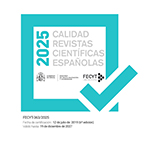Conocimiento, poder y religión
hacia una consideración de la mística teresiana como discurso filosófico
Resumen
El objetivo del trabajo es demostrar que numerosas cuestiones teológico-filosóficas han sido obviadas durante siglos (o relegadas a la categoría de “místicas”, de menor prestigio social) por el simple hecho de provenir de mujeres. Para ello, entendiendo el conocimiento como una práctica axiológica, se distingue entre práctica científica (llevada a cabo por los hombres) y práctica religiosa (llevada a cabo por hombres y muy controlada en las mujeres) y asumiendo una diferencia entre la importancia de la investigadora como sujeto cognoscente y el papel de la investigada como objeto productor de conocimiento. Cuestionando, entonces, por qué no se pueden considerar discurso teológico-filosófico los diferentes fragmentos que mostramos del Libro de la vida de Teresa de Ávila, empleado aquí a modo de ejemplo, se efectúa su análisis desde los principales parámetros de la filosofía de la religión feminista: a) su experiencia mística como acceso al conocimiento de la divinidad, asumiendo la existencia de Dios e interactuando directamente con Él; b) el papel desempeñado por su cuerpo en el proceso de conocer lo sagrado y la consecuente ruptura del dualismo cuerpo-mente y c) las repercusiones éticas que todo esto conlleva en la superación teresiana de la paradoja cristiana del mal. La aportación primordial se encuentra en la aplicación de los principales rasgos de una filosofía feminista de la religión anglosajona a un caso español para defender la necesidad de que el discurso femenino se convierta sin tapujos en una fuente de conocimiento para la investigación, para construir tanto práctica científica como práctica religiosa, en un afán final de proponer la revisión, bajo esta perspectiva, de todas las obras femeninas redactadas a lo largo de la historia que han sido patriarcalmente etiquetadas como “literatura mística” o “literatura espiritual”.
Descargas
Descarga artículo
Licencia
La revista Investigaciones Feministas, para fomentar el intercambio global del conocimiento, facilita el acceso sin restricciones a sus contenidos desde el momento de su publicación en la presente edición electrónica, y por eso es una revista de acceso abierto. Los originales publicados en esta revista son propiedad de la Universidad Complutense de Madrid y es obligatorio citar su procedencia en cualquier reproducción total o parcial. Todos los contenidos se distribuyen bajo una licencia de uso y distribución Creative Commons Reconocimiento 4.0 (CC BY 4.0). Esta circunstancia ha de hacerse constar expresamente de esta forma cuando sea necesario. Puede consultar la versión informativa y el texto legal de la licencia.











